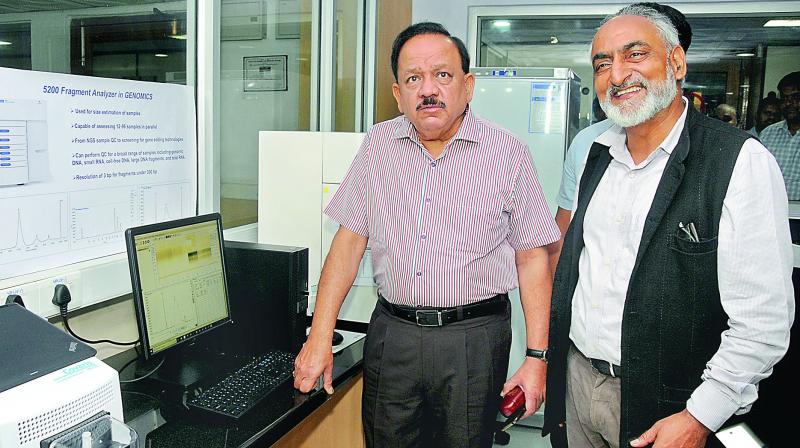Hyderabad: CCMB gets unit on genetic disorders
8 cr suffer from genetic disorders; they need Rs 3.5L-cr for treatment.

Hyderabad: Researchers at the Centre for Cellular and Molecular Biology say that the high birth rate was leading to a huge population of infants with genetic disorders.
To counter the challenge, the CCMB has acquired a facility which can sequence up to 30 human genomes in a day. This will help in generating largescale genomic data from the Indian population.
The ‘Next Generation Facility’ was inaugurated by Union health minister Dr Harsh Vardhan at the CCMB on Saturday.
The Organisation For Rare Diseases estimates that up to eight crore Indians suffer from genetic disorders and they require Rs 3.5 lakh crore for medical care.
Speaking at the inauguration, Dr Harsh Vardhan said, “The Union health ministry has created a separate team to research rare and orphan diseases which are associated with genetics. With precise genome sequencing and DNA analysis, our labs will be able to give the right type of guidance and counselling to susceptible patients. The research in our labs should not be limited to the publication of papers in good journals but it should be also translate to benefit society.”
Scientists said that for a country like India with its heavy genetic disease burden, parental genetic screening and counselling are essential in preventing genetic disorders in newborns. With the new facility the researchers will be able to carry out single cell genomics and transcriptions using barcoding capacities which would help researchers to individually tag genomes of up to 80,000 cells in eight minutes.
It not only opens up multiple avenues in investigating the fundamental biology of individual cells in tissues but it will also help in fighting diseases like cancer through understanding the heterogeneity in the respective cell populations.
The minister also laid the foundation stone for a scale-up facility for agrochemicals which is proposed to be constructed at Indian Institute of Chemical Technology Hyderabad campus. The Agro Mission project is aimed at developing sustainable agricultural practices.
A scientist said that the demand for such medicines was low in the market and the required medicines were often imported from western and European manufacturers. The lack of an industrial level manufacturing facility makes the whole treatment very expensive. The facility at the IICT will provide industries a chance to establish similar units.

